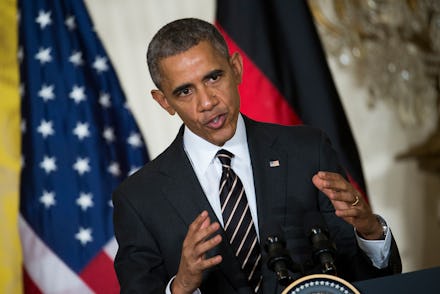President Obama Has Officially Asked Congress to Declare War on the Islamic State

Updated: Feb. 11, 2015, 4:06 pm
President Barack Obama has formally asked Congress to authorize the use of military force in the war against the Islamic State group, marking the first time in 13 years a U.S. president has asked for such authorization.
At a White House press conference on Wednesday afternoon, Obama discussed the proposal. "This is a difficult mission, and it will remain difficult for some time," he said, according to MSNBC. "It's going to take some time to dislodge these terrorists, especially from urban locations."
But he had harsh words for the Islamic State: "ISIL is on the defensive, and ISIL is going to lose."
Capitol Hill received a draft of the proposal Wednesday morning. It caps military action to three years and restricts the use of ground forces. It doesn't specify geographic locations for any potential military campaigns and gives a loose definition of enemy forces as "individuals and organizations fighting for, on behalf of, or alongside ISIL or any closely related successor entity in hostilities against the United States or its coalition partners."
The proposal's language underlines the administration's view of the danger posed by the Islamic State group. It highlights the group's potential for carrying out international terrorist attacks, its execution of "despicable acts of violence" and its "depraved, violent and oppressive ideology."
The resolution would also repeal a 2002 Iraq War authorization of military force (AUMF), but it would leave the 2001 AUMF, which is much broader in its authorization of power, in place.
It's important to note that the proposal is retroactive. The U.S. began bombing the Islamic State group in August 2014. The difference now is that Obama is asking Congress for formal permission to do so rather than leaning on his presidential authority.
The issue has long been a point of contention. Some lawmakers believe Obama has overstepped his authority in dealing with the Islamic State group, and while the White House long maintained that it wanted approval from Congress, Wednesday's AUMF is the first step in that direction.
"Obama's proposal launches an ideological debate over what authorities and limitations the commander in chief should have in pursuit of the extremists, with the shadow of lost American lives hanging over its fate," the Associated Press wrote.
There's still a good deal that needs to be sorted out. While both political parties appear to condone the use of force against IS, the precise plan of action is still unclear and will likely continue to be a thorny issue for both sides.
Some, for example, take issue with Obama's plan to keep the 2001 AUMF in place, particularly in the language used to describe when ground troops can't be utilized: "Enduring offensive ground combat operations."
"What does it mean? How long, how big, is 'enduring'? 'Offensive,' what's 'offensive'?" Senate Minority Whip Dick Durbin (D-Ill.) said Tuesday, according to the Huffington Post. "We have some legitimate questions as to whether we open this up with a loophole that could lead to another major war."
The full text of the White House's AUMF:
Obama's letter to Congress outlining the proposal: